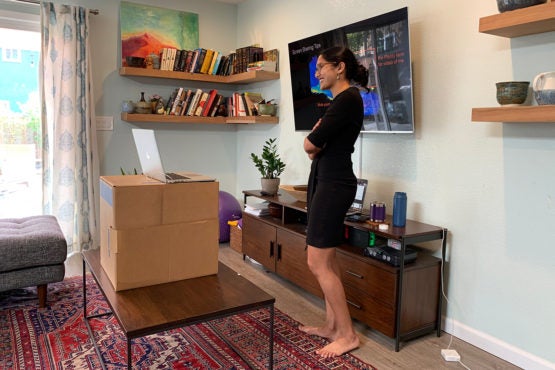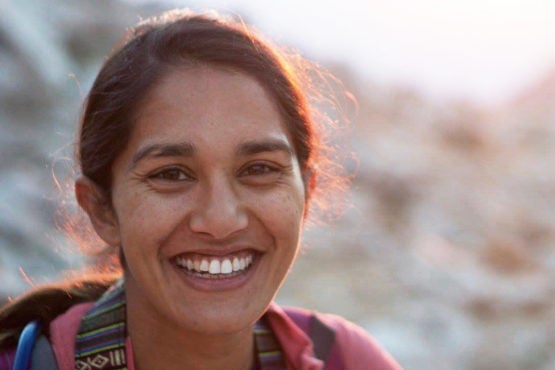Stanford student presents PhD defense virtually
Following county orders to limit gatherings due to the spread of COVID-19, doctoral student Anjali Bisaria presented her PhD defense via Zoom.
Stanford doctoral student Anjali Bisaria wasn’t going to let a global pandemic stop her from completing her PhD. On Tuesday, she presented her defense via a video conference call from her off-campus residence.

Doctoral student Anjali Bisaria presents her defense via a Zoom meeting from her living room. (Image credit: Courtesy Anjali Bisaria)
Bisaria is a sixth-year doctoral student studying chemical and systems biology at the Stanford School of Medicine and is a member of the Tobias Meyer Lab. After months preparing for the biggest day of her Stanford career, she logged into a Zoom meeting to defend her research before a virtual audience of about 60 people, including advisers, classmates, friends and family.
“I was definitely a little apprehensive,” Bisaria said. “I was worried that all the effort I had put into making my slides and presentation might be lost in the ether of streaming it.”
Sheltering in place
Over the past couple of weeks, as the threat of the novel coronavirus has grown, the circumstances of Bisaria’s defense became more and more uncertain. Although the date and time of her presentation never changed, where and how she would present became rapidly evolving questions. When Santa Clara County residents were ordered to shelter-in-place on Monday, Bisaria and her advisors decided she would have to give a completely virtual presentation from her home in Menlo Park.
Bisaria’s defense began at 2 p.m. and took place in her living room, where she placed her computer on a cardboard box. Although presenting her defense online wasn’t how she’d always imagined it, she said it did afford her some comforts. “I was in my pajamas until about 1:15 p.m.,” she said, adding that she also gave her presentation barefoot.
During her presentation, Bisaria defended her research on cell migration, specifically her development of a tool that measures the density and distribution of parts of the cytoskeleton that couldn’t be measured before. After a presentation that lasted just over an hour – followed by a private Zoom session with her five faculty examinees – Bisaria was declared a doctor.
Although having to shelter in place was not an ideal way of marking the completion of her doctoral studies, Bisaria said she understood that the well-being of everyone involved was important.
“I know it was the right thing to do to keep the community safe,” she said. “But it was a little bit sad because this is likely my last quarter on campus. So to not be able to interact with my classmates and not be able to enjoy that honeymoon phase of grad school felt unceremonious.”
Virtual celebrations
At Stanford, the completion of doctoral defense presentations is often marked with celebrations by classmates and advisers. Despite the physical distance between them, Bisaria’s colleagues made sure to keep up the tradition.

Stanford doctoral student Anjali Bisaria. (Image credit: Courtesy Anjali Bisaria)
“Afterward, everyone in my lab logged into a different Zoom meeting and we all toasted remotely and hung out for about 30 minutes as a way to mark the occasion,” she said.
Bisaria is from Knoxville, Tennessee, and completed her undergraduate studies in molecular biology at Princeton University. She’s also the second person in her family to study at Stanford; her older sister Namita completed her doctoral studies in biochemistry in 2015.
Now that she has successfully completed her PhD, Bisaria will spend spring quarter completing her dissertation before graduating. She has already begun applying for positions in the biotech industry and conducting interviews virtually. She hopes to use her Stanford training to help improve the way drugs are developed in the future.
Presenting her defense during a global pandemic was not how she expected to end her Stanford career. Despite these unusual circumstances, Bisaria said she’s mindful of the good that’s come out of this experience.
“With everything happening and all the uncertainty, it’s been really important for me to take stock of all the positive things going on like the support from my community. Everyone from my committee, lab, friends and family have been working together to make sure that I was still able to get to this milestone,” she said, adding that she’s amazed by the larger efforts in the Stanford community to support one another and the greater good.
“Whether labs are donating supplies for testing or individuals are volunteering to do grocery deliveries or help people move, I think our community is showing its best colors,” she said. “Even in isolation, we can still rely on Stanford and our broader community.”
